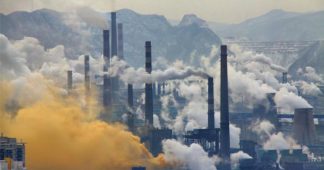August 6, 2019
Control of oil has long been a key aim of U.S. foreign policy. The Paris climate agreements and any other Green programs to reduce the pace of global warming are viewed as threatening the aim of dominating world energy markets by keeping economies dependent on oil under U.S. control. Also blocking U.S. willingness to help stem global warming is the oil industry’s economic and hence political power. Its product is not only energy but also global warming, along with plastic pollution.
This fatal combination of the national security state’s mentality and oil industry lobbying threatens to destroy the planet’s climate. The prospect of raising temperatures and sea levels along the coasts while inland regions suffer drought is viewed simply as collateral damage to the geopolitics of oil. The State Department is reported to have driven out individuals warning about global warming’s negative impact.[1]
The only attempts to restrict oil imports are the new Cold War trade sanctions to isolate Russia, Iran and Venezuela. The aim is to increase foreign dependence on U.S., British and French oil, giving American strategists the power to make other countries “freeze in the dark” if they follow a path diverging from U.S. diplomatic aims.
It was the drive to control the world’s oil trade – and to keep it dollarized – that led the United States to overthrow the Iranian government in 1953, George W. Bush and Dick Cheney to invade Iraq in 2003, and most recently for Donald Trump to isolate Iran while backing Saudi Arabia and its Wahabi foreign legion in Syria, Iraq and Yemen. Sixty years earlier, in 1953, the CIA and Britain joined to overthrow Iran’s elected President Mohammad Mosaddegh to prevent him from nationalizing the Anglo-Iranian Oil Company. A similar strategy explains U.S. attempts at regime change in Venezuela and Russia.
While seeking to make other countries dependent on U.S.-controlled oil, America itself has long aimed at energy self-sufficiency for itself. In the 1970s the Energy Research and Development Administration (ERDA) developed the environmentally disastrous plan to promote North American energy independence by tapping Canada’s Athabasca tar sands. About ten gallons of water are needed to make each gallon of synthetic crude oil. This water is treated as a free good, not factored into the cost of extracting syncrude. (I was the lead Hudson Institute economist evaluating ERDA’s plans, and was removed from the study when I protested that this might cause downstream water problems.) A byproduct of American energy self-sufficiency may be to make water scarcer and more expensive, especially as fracking pollutes local water resources while diverting an immense flow of fresh water as part of the extraction-and-pollution symbiosis.
The short-sightedness of America’s aggressive oil diplomacy is causing opposition in Europe as it buckles under unprecedented summer heatwaves, just as U.S. cities are being devastated by drought, forest fires, floods and other extreme weather. Yet this has not dented the basic thrust of U.S. foreign policy to control oil.
Oil in the U.S. balance of payments
Control of oil has long been a major contributor to the U.S. trade and payments, and hence of the dollar’s ability to sustain the huge outflow of overseas military spending. In 1965 I conducted a study for the Chase Manhattan Bank and found that in balance-of-payments terms, every dollar of oil industry investment outflow is recovered in just 18 months. That is because hardly any of the reported import value of oil was paid to foreigners.
To the extent that the United States must import foreign oil, such trade has been limited to U.S. oil majors (on “national security” grounds), mainly from their own foreign branches. Only a small proportion of the price was paid in foreign currency. U.S. companies bought crude oil from their foreign branches at very low prices, and allocated all the price markup to their shipping affiliates in Panama or Liberia, along with shipping and freight costs, dividends and interest, managerial charges and charges for capital investment, depreciation and depletion. Most of what is counted as U.S. foreign investment in oil takes the form of machinery exports, U.S. materials and management, and so did not actually represent a dollar outflow. The effect has been to obtain oil imports at minimal balance-of-payments cost.
Since 1974, Saudi Arabia and neighboring Arab countries have been told that they can charge as high a price as they want for their oil. After all, the higher the price they charge, the higher the profits will be for domestic U.S. oil producers. The “conditionality” is that they must recycle their export earnings into the U.S. financial market. They have to keep their foreign reserves and most personal financial wealth in U.S. Treasury securities, stocks and bonds. A global move away from oil would impair this circular flow of oil-production gains into U.S. financial markets supporting domestic stock prices.
Solar energy technology and other alternatives to oil will not contribute nearly as much to the balance of payments as oil. Not only will environmentally friendly alternatives be outside the ability of U.S. diplomats to control or cut off energy supplies to other countries, but China is taking a leadership position in solar energy technology.
A major factor bolstering the oil industry’s economic power has been its tax-avoiding “flags of convenience” located in offshore banking centers. U.S. oil companies have long resisted taken their profits from production, refining and distributing in Panama and Liberia. Over fifty years ago the treasurer of Standard Oil of New Jersey walked me through how the oil industry pretended to make all its profits in the tax havens that had no income tax-paying a low price to oil-producing countries and charging a high price to downstream refiners and marketers.
One implication of this is that there is little political chance of any cleanup of tax avoidance via offshore banking centers, by Western investors and indeed the world’s criminal class and corrupt politicians, given the fact that oil and mining are the major beneficiaries. Weakening the lobbying power to prevent closing the tax loopholes that permit the fictitious cost-accounting of tax-avoidance centers would weakening the oil industry’s economic power.
U.S. foreign policy is based on making other countries dependent on U.S. oil
U.S. diplomatic strategy is to make other countries dependent on vital materials that U.S. diplomats can use as an economic lever. An early example were the food sanctions imposed in the 1950s to spur resistance to Mao’s revolution in China. Canada broke the grain embargo.
If other countries produce their energy by solar power, wind power or nuclear power, they will be independent of U.S. oil diplomacy and its threats to cut off their energy supplies, grinding their economies to a halt if they don’t endorse U.S. neoliberal economic policies. This explains why the Trump Administration withdrew from the Paris climate agreement to slow global warming.
U.S. Cold War 2.0 policy is aimed at isolating Russia
U.S. energy self-sufficiency finds its counterpart in the demand that Europe becomes dependent entirely on American “Freedom Gas,” at a much higher price than is available from Russia’s Gazprom and reject the Nordstream 2 pipeline, preventing it from obtaining lower-priced rival gas from Russia.[2] The Trump administration argues that to avoid dependency on Russia, Europe should buy its oil and gas at much higher prices from the United States – about 30% higher, in addition to the expense of building LNG ports to transport liquified natural gas by ocean tanker instead of by Russian pipeline. “We’re protecting Germany from Russia and Russia is getting billions and billions of dollars in money from Germany,” Trump complained to reporters at the White House during a meeting with Polish President Andrzej Duda.[3]
On July 31, 2019 the Senate Foreign Relations Committee voted 20 to 2 to back the “Protecting Europe’s Energy Security Act” sponsored by right-wing Republican Ted Cruz and Blue Dog New Hampshire Democrat Jeanne Shaheen. Companies in Switzerland and Italy were first to be censored.
Global warming and GDP accounting
Warmer air temperature means a higher rate of evaporation, and hence more rain, tornados and flooding, as we are seeing this year. A related result will be drought as glaciers melt and no longer feed the major rivers on which dams have been built to generate electric power. The seeming irony is that these effects of global warming and extreme weather have become bulwarks of the rise in U.S. GDP. The cleanup costs of air and water pollution, the expense of rebuilding flooded or damaged homes, crop destruction, the increased cost of air conditioning, of coping with the spread of injurious insects northward and the rise in medical and health costs may actually account for all its growth since 2008.
Neoliberals celebrated the End of History after the Soviet Union dissolved in 1991, promising an era of new growth as “the market” became the world’s planner. They did not spell out that much of this growth would take the form of coping with the short-termism of the oil industry and other rent extractors living in the present and taking their money and running.
What factors should a Green Policy emphasize?
As Mark Twain quipped, “Everyone talks about the weather, but nobody does anything about it.” In today’s political world, doing something about global warming means taking on a set of goliaths that go beyond the oil and gas industry. It is one thing to say that global warming, climate change and the resulting extreme weather are existential threats to present-day civilization and economies. It is another to spell out the preconditions for solving the problem in the sphere of economic and tax reform, military and U.S. national security policy.
A Green program cannot succeed without confronting the National Security state’s mentality aiming at U.S. oil supremacy. U.S. national security has become a war threatening the security of the entire globe. Threatening to freeze countries in the dark if they do not follow U.S. policy and isolate Iran and Russia, the United States is burning itself up along with the rest of the planet.
Stopping global warming requires a tax policy to close down the special privileges promoting oil industry profits including the use of “flags of convenience” in offshore banking centers as a means of tax avoidance. A Green program logically would include a natural-resource rent tax (as classical economists advocated throughout the 19th century), and charges for what economists call “external economies,” that is social costs that are “externalities” to the corporate balance sheet. Companies should become liable to reimburse society for such costs.
Imposing a tax on oil usage would raise the price of gasoline, but would not deter consumption much in the short run because car drivers and public utilities already are locked in to oil-using capital investments. A more effective response would be to reduce the profitability of oil by closing the tax-avoidance loopholes and “flags of convenience” that the industry’s lobbyists have created. “Oil industry accounting” leaves “Hollywood accounting” and Donald-Trump style real-estate accounting in the dust.
The public relations problem with this solution is that this practice of pretending to “earn” all one’s income in small island enclaves with no income tax has become so widespread that it has created an enormous vested interest now including the leading IT giants, industry and real estate. Depriving tax accountants of recourse to such tax-avoidance centers also threatens America’s National Security state by challenging its perceived national interest in attracting the world’s criminal capital to these enclaves as a bulwark of the U.S. balance of payments. The world’s wealthiest corporations and tax evaders are aligned against an economic policy that would most help reduce the carbon footprint by moving beyond oil and gas.
To implement a successful Green policy program, it thus is necessary to move beyond the environmental problem to take on a broad and wealthy array of vested interests. They will cite free-market ideology as justification for taking their money in the short run, without care for the weather disaster they are causing. That makes the task much more daunting, and also may limit the ideological appeal of a real Green program.
In countries such as Iceland and Germany, neoliberal Green Parties tend to be centrist and conservative when it comes to supporting banks and the financial sector, and endorse a market-based bonanza of carbon trading rights to be bought and sold by Wall Street speculators. The problem is that such “market-based” solutions must fail, because markets are short-term and do not take account “externalities.” Are Greens willing to criticize this “market philosophy” and its tunnel vision? Without such a challenge, Green parties will appeal largely to “feel good” voters who want to register their politically correct concern without doing much to actually solve the underlying problem.
We indeed seem to be entering the End Time. It is turning out to be the antithesis of the neoliberal End of History that was being celebrated in 1991 as free market victory after the Soviet Union collapsed. It is a crisis of Western civilization, not its apex.
Notes.
1) Rod Schoonover, “My Climate Report Was Quashed,” New York Times op-ed, July 31, 2019, reported that the White House blocked his report on the adverse effects of climate change on the ground that “the scientific foundation of the analysis did not comport with the administration’s position on climate change.” ↑
2) Regarding U.S. National Security Strategy (NSS) of Energy Dominance, see Ben Aris, “Busting Nord Stream 2 myths,” Intellinews.com, August 27, 2018. U.S. Secretary of Energy Rick Perry has likened U.S. gas to American soldiers liberating Europe from the Nazis. “The United States is again delivering a form of freedom to the European continent,” he told reporters in Brussels earlier this month. “And rather than in the form of young American soldiers, it’s in the form of liquefied natural gas.” See also and https://truthout.org/articles/freedom-gas-will-be-used-to-justify-oppression-at-home-and-abroad/. ↑
3) “Euro Slides After Trump Threatens Sanctions To Stop NordStream 2 (Again!),” Zero Hedge, June 12, 2019. ↑
Published at https://www.counterpunch.org/2019/08/06/global-warming-and-u-s-national-security-diplomacy/











